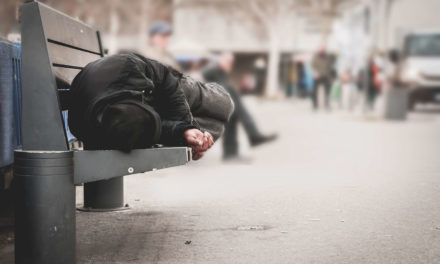De
daklozen in Californië en zoals ik het begrijp in de hele VS, mogen
niet langer beboet worden dan wel worden opgepakt omdat ze op straat
moeten slapen…… De VS, ‘het land van de ongekende mogelijkheden’,
in negatieve zin wel te verstaan en dat geld ook voor het overheidsbeleid in het buitenland….. Hoe is het mogelijk dat de zwaksten in de
maatschappij zo gepakt worden door hun eigen overheid, ‘The American Dream’ is dan ook al meer dan 200 jaar zo dood als een pier……
Wat een
voorbeeld ook voor de wereld, al weet je zo wel wat je kan verwachten van de VS wanneer je als natie niet gewillig aan de leiband van de VS loopt, zeker als je ziet hoe barbaars de VS al in eigen land bezig is tegen de
zwaksten van haar volk >> je kan dan als land buiten de VS niets anders verwachten dan dood en
verderf…. (zoals de geschiedenis laat zien en niet alleen vanaf 1945…)
De
daklozen mogen van 9 uur ‘s avonds tot 6 uur ‘s morgens op straat
slapen en gelukkig zijn er sommige burgemeesters die stellen dat er
rap ruimte moet worden gevonden of bijgebouwd om deze mensen
permanent humanitair op te vangen….
Lees het
volgende ongelofelijke relaas dat werd gepubliceerd op Money and Markets en geeft het door, het is te zot voor woorden dat
zoveel mensen niet zien hoe kwaadaardig de vereniging van VS terreurstaten in werkelijkheid zijn:
Supreme
Court: Sorry, California, Homeless Can Sleep on Sidewalks

Posted
by JT Crowe
| Dec 18, 2019 | News
The Supreme Court on
Monday said it will allow a lower court’s ruling stand that
protects the rights of the homeless to sleep on sidewalks or in
public parks if they don’t have anywhere else to go, which is a
significant setback for cities in California.
The justices refused
to take the case from Boise, Idaho, on without comment or dissent.
From the L.A. Times:
The outcome
was a significant victory for homeless activists and a setback for
city officials in California and other Western states who argued
the ruling
from the 9th U.S. Circuit Court of Appeals undercut their
authority to regulate encampments on the sidewalks. The 9th Circuit
had agreed with lawyers for the homeless who argued that prosecuting
people for sleeping on the sidewalks violated the 8th Amendment’s
ban on cruel and unusual punishment if a city failed to provide
adequate shelter.
The 9th Circuit —
which has jurisdiction over California and eight other states out
west — ruling said a city ordinance “violates the 8th Amendment
insofar as it imposes criminal sanctions against homeless individuals
for sleeping outdoors on public property, when no alternative shelter
is available to them.”
A recent White House
report notes that half
of America’s homeless population lives in California.
According to the L.A.
Times, officials in Los Angeles expressed disappointment because
the ruling leaves the law unclear about what they can do to curtail
masses of people sleeping on sidewalks and in parks. Officials joined
with Boise in asking the Supreme Court to hear the case and said it
was “never an attempt to criminalize the homeless; rather, it was a
pursuit of a legal framework that is clear — in comparison to a
status quo that is ambiguous and confusing.”
“Letting the current
law stand handicaps cities and counties from acting nimbly to aid
those perishing on the streets, exacerbating unsafe and unhealthy
conditions that negatively affect our most vulnerable residents,”
he said.
Los Angeles Mayor Eric
Garcetti said via statement that “homelessness won’t be solved by
moving people from one street to another. Our focus will remain on
providing services to save lives, keeping our neighborhoods clean and
healthy, opening shelters to help get people indoors more quickly,
and building permanent units to keep them under a roof for good.”
Lawyers for the
homeless in Boise pointed out that in 2014 the city told its police
not to enforce misdemeanor ordinances that banned sleeping or camping
in public as long as there weren’t any other shelter spaces
available, which the city thought would end the lawsuit. However, the
9th Circuit issued a more broad ruling in 2018.
The Supreme Court
justices then had to decide whether or not there is a constitutional
right to sleep on a sidewalk in a case in which the city wasn’t
enforcing the ordinances that were being challenged.
The case began more
than 10 years ago when a number of homeless people were given
citations of $25 to $75 for camping on sidewalks. They then joined a
lawsuit challenging the fines as unconstitutional. According to the
L.A. Times, a large number of West Coast cities urged the Supreme
Court to hear the appeal of the 9th Circuit ruling.
The “creation of a
de facto constitutional right to live on sidewalks and in parks will
cripple the ability of more than 1,600 municipalities in the 9th
Circuit to maintain the health and safety of their communities,”
lawyers for Boise wrote.
“Nothing in the
Constitution … requires cities to surrender their streets,
sidewalks, parks, riverbeds and other public areas to vast
encampments,” the lawyers wrote.
People sleeping,
urinating and defecating
on sidewalks has of course long been a plague in cities like Los
Angeles and in 2006, the 9th Circuit ruled that the city can’t
enforce laws against people sleeping in public. So rather than appeal
the ruling, the city reached a settlement with lawyers for the
homeless, agreeing not to enforce the ordinance from 9 p.m. to 6 a.m
